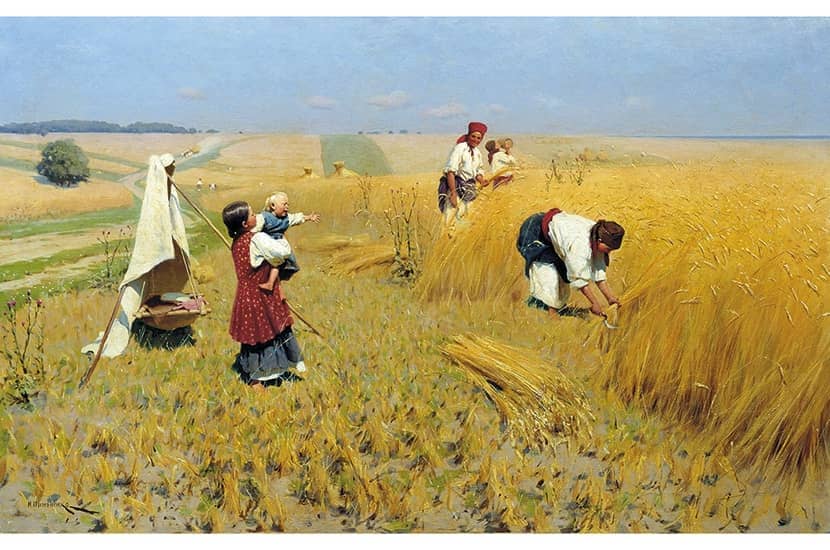Publishers love books with ambitious subtitles such as ‘How Bubblegum Made the Modern World’, and this one’s, about American wheat remaking the world, was no doubt devised to appeal to readers in the United States. It is not really appropriate: for ‘American’, read ‘Ukrainian’. The focal point of Oceans of Grain lies very far from the vast wheat fields of North America. This is mainly a book about Ukraine and the Black Sea, and the importance of Ukrainian grain in world history. Its appearance during the current war is extraordinarily timely.
Scott Reynolds Nelson insists that grain supplies have lain at the heart of millennia of conflict. He describes the first world war as ‘a war fought over nothing less than foreign bread’, tying together the failure of Russian plans to grow massive amounts of grain in Siberia and central Asia, the building of the Trans-Siberian Railway, Russia’s defeat by Japan in 1905, the first Russian revolution that year and tensions with Turkey over grain shipments in 1914, plus the lingering Russian ambition to recover Constantinople from the Turks.
The chumaki transported grain along trails hundreds of miles long, all the way to the Black Sea ports
Here the weaknesses in what in my undergraduate days we used to call ‘simplistic monocausal explanations’ become clear. The tsars did see the capture of Istanbul as a means to guarantee the passage of Ukrainian grain into the Mediterranean; at the same time, Nelson needs to recognise that the city had enormous religious significance to the Russian rulers of the ‘Third Rome’. And there was much more than this to the outbreak of the first world war. Nelson might place a little more emphasis on an assassination in Sarajevo, as well as the naval ambitions of Germany fostered by the Kaiser and his belligerent admiral, Tirpitz. Similar over-simplification occurs when he ascribes the fall of Constantinople to the Turks in 1453 to its loss of grain supplies. How so? It was little more than a shrunken village by then, and grain-rich Crimea was not yet in Turkish hands. Maybe a case can be made for the role of grain in the outbreak of the French Revolution (‘let them eat cake’), but only up to a point.
American publishers also love to place their authors in the text, so here he is, inspired to investigate the origins of Ukraine’s productivity by an advertisement at an Odessan bus stop for the refreshing grain-based drink kvass. He points to the chumaki, the people who over the centuries transported grain in vast wagons along trails hundreds of miles long, all the way down to the Black Sea ports. Ancient Greek colonies along the coast of Crimea supplied grain-poor Athens. During the late Middle Ages the Genoese colony at Kaffa in Crimea, with perhaps 50,000 inhabitants, fed Constantinople and places as far west as its mother city of Genoa. All these places, like 19th-century Odessa, contained a rich mix of ethnic and religious groups.
Sometimes Nelson’s argument that the future of the world turned on battles for grain works well. The defeat of the Turks by Catherine the Great around 1770 was facilitated by the failure of the Ottoman supply network. The empress understood the importance of controlling the rich black soil of Ukraine, or Novorossiya (‘New Russia’), as she called it. This led to the building of Odessa and to the spreading of large numbers of serfs across the open spaces of Ukraine. The chumaki trails became busier, longer and more numerous. Potato famine in Europe prompted greater consumption of grain by the poor, including white bread that was less nutritious but cost more and therefore had a certain cachet. The demand for grain was increasingly fed by American as well as Ukrainian supplies.
There is not much about America until page 103, mostly spread over the next 40 pages. One of the most important contributions of the American grain network was the use of futures contracts, though Nelson admits this was not a novelty (I have seen documents from the 13th century in Perpignan that fit the bill). Railways were another significant factor in the development of the American grain traffic, as was the telegraph, transmitting commercial data almost instantaneously across the Atlantic. American commentators were well aware that there was now an opportunity to undercut Ukrainian grain. In the late 19th century Antwerp enjoyed a new golden age as it became the principal port through which massive quantities of cheap American grain entered Europe, with major effects on the economy and public finance.
A large chunk of the book is devoted to the journalist, economist, Marxist revolutionary and also plutocrat Israel Gelfand, known as Parvus. He was a Belarusian Jew, ‘among the most important intellectuals of the 20th century’, a fascinating and highly ambiguous figure. His activities would feed conspiracy theories about a revolutionary Jewish cabal attempting to take over the world. He was bitterly critical of the tsarist minister Sergei Witte, whose policies were infused with strong anti-Semitism directed at the many Jewish middlemen dealing in grain in Ukraine and beyond. During the first world war Parvus urged the Germans to despatch Lenin in a sealed railway carriage on his famous journey to the Finland Station.
Only in the last few weeks has anybody noticed how much wheat, maize and sunflower oil has been reaching Britain and the rest of the world from Ukraine. Hitler and Putin are only two would-be conquerors who have coveted its resources. Readable, original and provocative, this is a book that deserves attention.







Comments